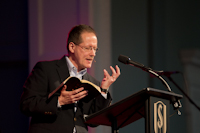Faculty Q and A with Chuck Lawless
CHRIS MARTIN | January 19, 2017


Q: Tell us about yourself.
A: My wife and I both grew up in Ohio and were “fixed up” by a couple of church secretaries. In May, we will have been married for 23 years. We don’t have any children, so we’ve spent our time raising students.
I spent 16 years at Southern Seminary, and I’ve worked with the International Mission Board (IMB) since 2008 in both part and full time capacities. Even now, I serve full-time at Southeastern, but also work with the IMB as Global Theological Education Consultant.
Q: How did you come to SEBTS?
A: I met Dr. Akin when we served together at Southern Seminary, so we’ve known each other for a while. I met Dr. Ashford via connections through the IMB, and he and Dr. Akin asked me to join their team here at SEBTS about a year and a half ago as Dean of Graduate Studies. I had always admired from afar the Great Commission passion of SEBTS. Now I get to see it up close.
Q: When people ask you, “What do you do at Southeastern,” what is your response?
A: As Vice President of Graduate Studies and Ministry Centers, I work alongside everyone associated with graduate and advanced degrees. I also collaborate with the directors of our ministry centers: the Bush Center for Faith and Culture, the Center for Great Commission Studies and the Spurgeon Center for Pastoral Leadership and Preaching.
Q: On what are you currently working?
A: I write a weekly blog for Dr. Thom Rainer’s blog every Tuesday (www.thomrainer.com). I am working on a book right now that’s tentatively called “Bullseye: Spiritual Warfare in the Life of the Christian Leader,” based on research we’ve conducted on what kind of warfare pastors and missionaries face.
Q: What have you been reading recently?
A: “Finish the Mission” edited by John Piper, which deals with unengaged and unreached people groups. I’ve also been re-reading Paul Miller’s “A Praying Life.” I have an interest in military literature, and a student loaned me a book called “Intelligence in War,” which is about military intelligence work.
Q: When you get home from work, what do you look forward to doing?
A: I enjoy exercising, working outdoors and hiking.
Q: Who are your role models?
A: My pastoral mentor, Jack Tichenor, passed away a number of years ago. He pastored for 60 years and took me under his wing as a young pastor. He mentored me in every decision in ministry until he passed away.
Tom Elliff is one of my contemporary role models because he’s theologically informed, evangelistically driven and prayer focused. Plus, he’s just a nice man to everyone.
Q: What has God been teaching you lately?
A: It’s basic, but it’s the reality that God is never through with sanctifying and changing us. There’s always room for growth. Quite often he uses other people to point out those blind spots in our lives.
Q: Where are some of your former students?
A:I regularly correspond with a number of former students all over the world in all sorts of positions. Many are pastors, professors, missionaries and otherwise serving God around the world.
Q: When a student completes your class, what do you want him or her to walk away with at the end of the semester?
A: I want students to have an increased desire to know God and have a deeper commitment to holiness and prayerfulness. I hope they have a bigger heart for evangelizing their neighbors and the nations and to have a greater love for the church. Finally, I’d like them to have head knowledge and the ability to practically apply it.
Q: We always say that every classroom at SEBTS is a Great Commission classroom. What does that look like for your classes or for the graduate program overall?
A: It’s about pushing students to realize the world is much bigger than what they’ve experienced, and that we’ve got to get the gospel to the whole world. It’s about teaching students to think well and to minister well as they do the Great Commission.